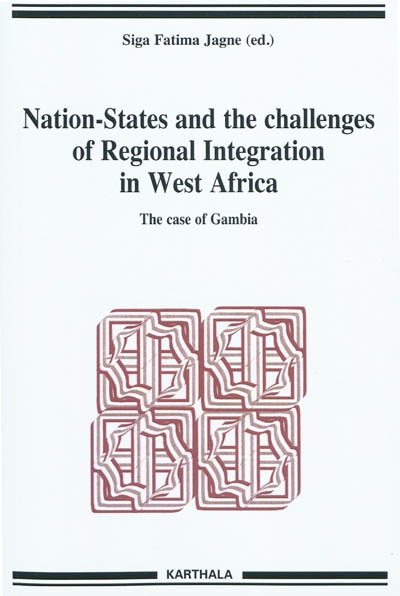en savoir plus

Carte fidélité
Permet à tous ses détenteurs d'obtenir 5% de réduction sur tous les livres lors du retrait en magasin (réduction non cumulable avec les réductions de type étudiant).
Offre également un certain nombre d'avantages auprès de nos partenaires.
Wishlist
Avec les favoris, retrouvez dans un espace les sélections effectuées au fur et à mesure de vos navigations dans le site.
Constituez pour votre usage personnel vos listes de livres en prévisions d'achats futurs et votre sélection d'articles, dossiers, événements, vidéos ou podcasts préférés ou à découvrir plus tard...
Il suffit simplement de cliquer sur "Ajout Favori" sur chaque page qui vous intéresse pour les retrouver ensuite dans votre espace personnel.
Requiert un compte Mollat
Mes Alertes
Requiert un compte Mollat
Nation-States and the challenges of regional integration in West Africa. Vol. 12. The case of Gambia
en savoir plus
Résumé
Contributions à un séminaire de 2005 sur l'intégration régionale dans la Communauté économique des Etats de l'Afrique de l'Ouest : les dynamiques de l'intégration, le rôle de chaque pays, les défis à relever par les populations, etc. Présente les particularités économiques, sociales et linguistiques de la Gambie. ©Electre 2025
Lire la Quatrième de couverture
Réduire la Quatrième de couverture
The central position of the Gambia inside the territory of Senegal, which it cuts almost in two, represents one of the main challenges that both countries must address before thinking of any integration within the larger space of ECOWAS. This is why relations between the Gambia and Senegal were the main theme of topics presented at the national seminar held during two days in Banjul, namely the contradiction of two States sharing the same culture on both sides of their common borders.
The territory of the Gambia is confined to the narrow valley of the Gambia River and thus condemned to be an enclave in the absence of any outlet through neighbouring States, despite its access to the high seas and their shipping lanes. The lack of a bridge as well as the absence of shipping facilities up the Gambia River is a major handicap for all surrounding States. These should give first priority to the hardship suffered by local peoplewho spend hours, even days, waiting to cross the river at Farafiney. An eventual solution would certainly be the construction of at least three bridges on the river at its mouth, its centre and in the extreme north, and to guarantee the free movement of people and goods across it. But the Gambia must rein in its suspicions of Senegal, which in turn must reassure its neighbour by discarding any radical ideas of simply absorbing Gambian territory.
Paradoxically, respect for its colonial borders makes the Gambia a natural obstacle to the integration of the five Nation-States. The political solution lies in the re-development of this Southern region that would include Senegal, the Gambia, Guinea-Bissau and Guinea within the framework of the OMVG (Gambia River Basin Development Organization). This restructuring would need to take into account the complementarity of the OMVG with the OMVS (Sénégal River Basin Authority) and with the Mano River Union. Politically and economically, the Gambia has a key role to play as a trade gateway for the sub-region.
The seminar held in the Gambia was one of a series of national policy research dialogues, organized between 2005 and 2008 by the Social and Human Sciences Sector of UNESCO, with a view to bringing decision-makers, academics, civil society and other actors together to think about regional integration. Research must proceed and continue alongside the concrete process of making integration happen on the ground.
Fiche Technique
Paru le : 15/05/2010
Thématique : Essais d'économie
Auteur(s) : Non précisé.
Éditeur(s) :
Karthala
Collection(s) : Hommes et sociétés
Contributeur(s) : Editeur scientifique (ou intellectuel) : Siga Fatima Jagne - Préfacier : Boubacar Barry - Préfacier : Pierre Sané
Série(s) : Nation-States and the challenges of regional integration in West Africa
ISBN : 978-2-8111-0222-7
EAN13 : 9782811102227
Reliure : Broché
Pages : 138
Hauteur: 24.0 cm / Largeur 16.0 cm
Poids: 240 g
